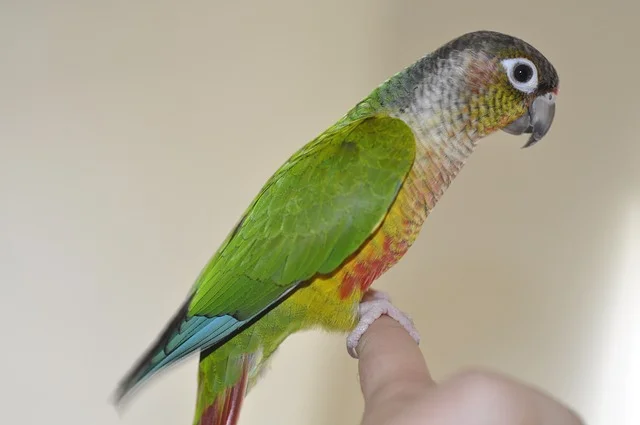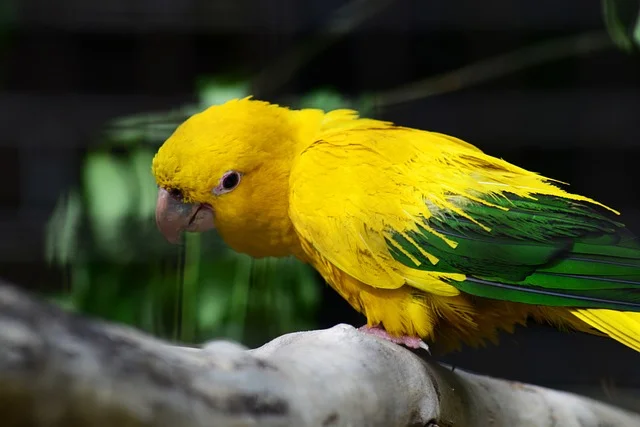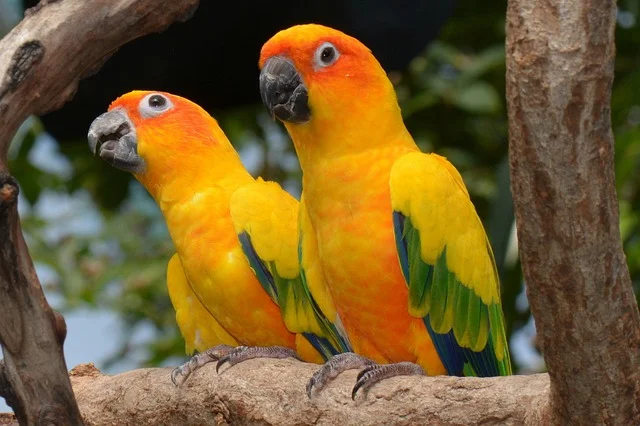Conures are popular pet birds known for their vibrant colors, playful nature, and charming personalities. These small to medium-sized parrots belong to the family Psittacidae and are native to the tropical regions of the Americas. In this article, we will explore the fascinating world of conures, their characteristics, their care requirements, and why they make wonderful companions.
What are Conures?

Conures are a diverse group of parrots that originate from Central and South America. They are known for their striking plumage, which often includes bright greens, yellows, oranges, and blues. These energetic and social birds have fascinated bird enthusiasts worldwide with their playful antics and engaging personalities.
Types of Conures
There are numerous conure species, each with its unique colors, patterns, and characteristics. Some popular conure species include:
- Green-cheeked Conure
- Sun Conure
- Blue-crowned Conure
- Jenday Conure
- Nanday Conure
- Pineapple Conure
- Crimson-bellied Conure
- Dusky Conure
- Patagonian Conure
- Golden-capped Conure
Physical Characteristics of Conures
Conures come in various sizes, ranging from 10 to 20 inches in length. They have a stocky build with strong beaks designed for cracking nuts and seeds. The feathers of conures display a wide array of colors, often featuring vibrant shades of green, red, yellow, and blue. Their expressive eyes and long, tapered tails add to their overall charm.
Conure Behavior and Temperament
Conures are known for their lively and outgoing nature. They are highly intelligent birds that thrive on social interaction and mental stimulation. These playful birds enjoy spending time with their owners and can form strong bonds with them. Conures are also known for their acrobatic abilities, as they love climbing, swinging, and hanging upside down.
Housing and Cage Requirements
Providing a spacious and enriching living environment is important for the well-being of conures. A cage with appropriate bar spacing and dimensions should be provided, allowing the bird to stretch its wings fully. It is important to include perches, toys, and foraging opportunities to keep the conure mentally and physically stimulated.
Choosing the Perfect Cage
To ensure the comfort and security of your conure, selecting an appropriate cage is of utmost importance. Opt for a spacious cage that allows your conure to spread its wings and move around freely. The bar spacing should be narrow enough to prevent the bird from getting stuck but not so wide that it can escape. Additionally, consider the following factors:
- Size: A cage with dimensions of at least 24 inches in width, 24 inches in depth, and 24 inches in height is suitable for a single conure. Larger cages are preferable, as they provide more room for exploration and exercise.
- Material: Choose a cage made of sturdy, bird-safe materials such as stainless steel or powder-coated metal. Avoid cages with zinc or lead, as they can be toxic to birds.
- Bar Placement: Horizontal bar placement provides opportunities for climbing and exercising. Ensure that the bars are close enough together to prevent your conure from escaping.
- Accessibility: The cage should have multiple doors to facilitate easy access for cleaning, feeding, and interacting with your conure.
Cage Setup and Accessories
Creating an enriching environment within the cage is vital for the mental and physical stimulation of your conure. Consider adding the following accessories:
- Perches: Provide natural wooden perches of varying thicknesses to promote foot health and exercise.
- Toys: Offer a variety of toys that encourage foraging, chewing, and climbing. Rotate the toys regularly to prevent boredom.
- Food and Water Dishes: Ensure the availability of fresh food and water at all times. Use sturdy, easy-to-clean dishes that cannot be tipped over easily.
Conure Diet, Nutrition and Feeding Tips
Maintaining a well-balanced diet is important for the overall health and vitality of your conure. A nutritionally complete diet should consist of:
- Pellets: High-quality pellet brands formulated specifically for conures are a staple in their diet. These pellets provide essential vitamins, minerals, and nutrients.
- Fresh Fruits and Vegetables: Offer a wide variety of fresh fruits and vegetables, such as apples, bananas, carrots, and leafy greens. These should make up approximately 30% of the conure’s daily food intake.
- Seeds and Nuts: Use seeds and nuts as occasional treats due to their high-fat content. They should not exceed more than 10% of the conure’s overall diet.
Exercise and Enrichment for Conures
Conures are active birds that require both physical exercise and mental stimulation to thrive. Here are some activities to keep your conure engaged:
- Flight Time: Allow your conure to fly in a safe, supervised area outside of its cage for at least one to two hours daily.
- Training and Tricks: Teach your conure new tricks and commands using positive reinforcement techniques. This will enhance their mental agility and strengthen the bond between them.
- Social Interaction: Conures are highly social birds and require regular social interaction with their owners. Spend quality time with your conure through play, training, and gentle handling.
Health and Common Health Issues

Maintaining good health is crucial for conures. Regular veterinary check-ups are necessary to monitor their overall well-being. Some common health issues in conures include feather plucking, respiratory infections, beak and feather disease, and psittacosis. Proper hygiene, a balanced diet, and a stress-free environment can help prevent many health problems.
Training and Socialization
Conures are intelligent birds that can be trained to perform tricks, follow commands, and even mimic human speech. Positive reinforcement techniques, such as clicker training and reward-based methods, work well with conures. Early socialization and consistent handling from a young age are key to ensuring a well-adjusted and friendly conure.
Vocalizations and Communication
Conures are known for their vocal abilities and can produce a wide range of sounds. They use vocalizations to communicate their needs, express emotions, and interact with their surroundings. While their vocalizations can be noisy at times, understanding their different calls can provide insights into their mood and behavior.
Conure Breeding and Reproduction
Breeding conures require careful planning and preparation. Providing suitable nesting boxes, a nutritious diet, and optimal environmental conditions can encourage breeding behavior. Female conures lay eggs, and both parents take turns incubating them. The incubation period lasts for about 21 to 28 days, after which the chicks hatch.
Lifespan and Longevity
The lifespan of conures can vary depending on the species and the care provided. On average, conures live for 15 to 30 years, although some species can live even longer with proper care and nutrition. By meeting their physical, emotional, and social needs, conure owners can help ensure a long and healthy life for their feathered companions.
Interacting with Conures: Dos and Don’ts
When interacting with conures, it is important to keep in mind a few key guidelines:
- Do provide plenty of social interaction and mental stimulation.
- Do handle them gently and avoid rough play.
- Do offer a variety of toys and puzzles for enrichment.
- Don’t expose them to harmful substances or toxic fumes.
- Don’t neglect their need for regular veterinary care.
Popular Conure Species as Pets

Among the many conure species, some are particularly popular as pets due to their striking colors and engaging personalities. The following conure species are often sought after by bird enthusiasts:
- Green-cheeked Conure: Known for their playful and affectionate nature.
- Sun Conure: Loved for their vibrant plumage and energetic personality.
- Blue-crowned Conure: Recognized for their intelligence and social skills.
- Jenday Conure: Admired for their vibrant colors and playful behavior.
- Nanday Conure: Known for their sociable and outgoing temperament.
Interacting With Your Conure
- Socialization: Conures are highly social birds and thrive on social interaction. Regularly engage with your conure through talking, singing, and gentle handling to strengthen the bond between you.
- Body Language: Pay attention to your conure’s body language to understand their mood and preferences. They may puff up their feathers when happy or excited while fluffing them tightly against their body can indicate fear or discomfort.
- Respect Personal Space: While it’s important to interact with your conure, respect their personal space and avoid overwhelming them with constant handling. Allow them to initiate contact and provide them with opportunities for independent play.
Preening Your Conure
- Feather Maintenance: Conures engage in preening activities to keep their feathers clean and in optimal condition. You can assist by gently misting them with water or offering shallow water dishes for them to bathe in.
- Mutual Preening: Conures are social birds that often engage in mutual preening with their flock members or human companions. This behavior strengthens social bonds and promotes a sense of security and well-being.
Understanding the Conure’s Stress
- Identifying Stress Signals: Conures may exhibit various signs of stress, including excessive vocalization, feather plucking, aggression, loss of appetite, or changes in behavior. Pay attention to these signals and identify the potential sources of stress in their environment.
- Minimizing Stressors: Create a calm and safe environment for your conure by minimizing stressors such as loud noises, sudden changes in routine, or exposure to unfamiliar people or animals. Provide them with a quiet retreat within their cage for relaxation.
Understanding the Conure’s Age
- Juvenile Conures: Juvenile conures are typically more active, curious, and prone to exploring their environment. They may display behaviors such as chewing or climbing excessively as they develop their motor skills and learn about their surroundings.
- Adult Conures: As conures reach adulthood, they tend to become more settled and develop a consistent personality. They may display preferences for certain foods, toys, or social interactions. Establishing a routine during this stage can provide a sense of security for your conure.
- Senior Conures: Senior conures may require special attention and care as they age. Monitor their diet, exercise, and overall health closely. Regular veterinary check-ups become even more important to catch age-related issues early on.
Tips for Conure Care
- Gentle Handling: When handling your conure, always approach them with care and gentleness. Avoid sudden movements or grabbing them forcefully, as it may cause stress or injury.
- Environmental Enrichment: Continuously provide new toys, puzzles, and activities to keep your conure mentally stimulated and prevent boredom.
- Positive Reinforcement: Use positive reinforcement techniques, such as treats and praise, to encourage desired behaviors and discourage unwanted ones.
- Consistent Routine: Establish a consistent daily routine for feeding, playtime, and interaction with your conure. Consistency helps them feel secure and aids in their overall well-being.
- Supervised Out-of-Cage Time: Always supervise your conure during their out-of-cage time to ensure their safety and prevent accidents or interactions with potential hazards.
Warnings and Cautionary Notes
- Toxic Substances: Keep your conure away from toxic substances, including household cleaners, aerosols, certain plants, and chemicals. These can be harmful if ingested or inhaled by your bird.
- Non-Stick Cookware: Avoid using non-stick cookware or overheating Teflon-coated pans in the vicinity of your conure. The fumes emitted from overheated non-stick surfaces can be toxic and potentially fatal to birds.
- Avocado and Chocolate: Never feed your conure avocados or chocolate, as these foods are toxic to birds and can cause severe health issues.
- Exposure to Extreme Temperatures: Conures are sensitive to extreme temperatures. Avoid exposing them to drafts, direct sunlight, or very cold or hot environments.
- Cage Placement: Place your conure’s cage in a safe and quiet area of your home, away from high-traffic areas, loud noises, and potential stressors.
By following these tips and warnings, you can ensure the safety, health, and happiness of your conure. Remember that each conure is unique, so observe their behavior closely and make adjustments as needed to meet their specific needs.
Conclusion
Conures are delightful parrots that bring color, charm, and companionship to their owners’ lives. With their vibrant plumage, engaging personalities, and ability to form strong bonds, conures have become popular pets among bird lovers. By providing proper care, a stimulating environment, and a loving home, conure owners can experience the joy and beauty of these charismatic feathered friends.
FAQs
Are conures good pets for beginners?
Yes, conures can be suitable for beginners, especially those who can provide the necessary care, attention, and social interaction.
How much social interaction do conures require?
Conures thrive on social interaction and enjoy spending time with their owners. They require a minimum of 2 to 3 hours of daily interaction and out-of-cage time.
Do conures require a specialized diet?
Conures need a balanced diet consisting of pellets, fresh fruits, vegetables, and a small portion of seeds or nuts. It’s important to avoid an all-seed diet, as it can lead to nutritional deficiencies.
Can Conures talk?
Yes, conures are capable of learning words and phrases. While not all conures become proficient talkers, they can mimic human speech to some extent.
Do conures require regular veterinary check-ups?
Yes, regular veterinary check-ups are essential to monitor the health of conures and detect any potential issues early on. It’s recommended to schedule annual examinations for your conure.
Can conures live alone, or do they need companionship?
Conures are social birds and benefit from companionship. While they can live alone, providing social interaction with their owners or introducing them to a compatible conure companion can enhance their well-being.
Are conures friendly?
Conures are known for their friendly and social nature. They enjoy interacting with their owners and can form strong bonds with them. However, individual personalities may vary, and some conures may require time and patience to warm up to new people or situations.
Are conures difficult to care for?
Conures can be relatively low-maintenance pets, but they do require proper care and attention. Providing a balanced diet, regular social interaction, mental stimulation, and a suitable living environment is important for their well-being. With the right knowledge and commitment, conures can be rewarding and enjoyable pets.
What are conures known for?
Conures are known for their vibrant colors, playful personalities, and engaging behaviors. They are often admired for their acrobatic abilities and their ability to form strong bonds with their owners. Conures are also recognized for their vocalizations, which can include a wide range of sounds and calls.
How long do conures live?
The lifespan of conures can vary depending on the species and the care provided. On average, conures can live for 15 to 30 years, although some species can live even longer with proper care, nutrition, and a suitable living environment.






